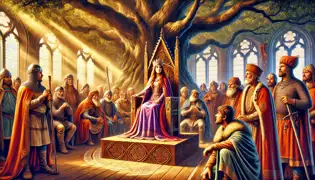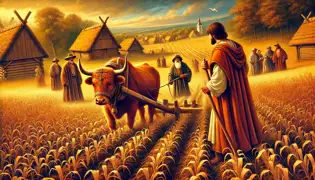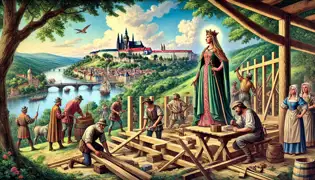The story of Queen Libuše is one of vision, leadership, and the founding of Prague, a city destined for greatness. Born into a time of change and challenge, Libuše’s wisdom and prophetic gifts carved her name into history. Yet her life was not simply about ruling—it was about weaving a legacy of fairness and unity amidst turbulence.
Her tale is no mere legend. It is a testament to the resilience of a people and the strength of a woman who dared to see a brighter future for her land. From her rise to power to her prophecy of Prague, every step of Libuše’s journey reveals her unwavering determination to shape Bohemia’s destiny. In the shadow of the dense Bohemian forests, the daughters of Krok the Wise grew up learning the delicate balance of nature, culture, and leadership. Krok, a revered judge and leader, had no sons, but his three daughters—Kazi, Teta, and Libuše—each inherited a fragment of his greatness. Kazi mastered the healing arts, Teta the spiritual mysteries of their people, and Libuše, the youngest, carried the gift of prophecy. From an early age, Libuše demonstrated an innate ability to mediate disputes with calm authority. Her eyes, as sharp as a hawk’s, seemed to pierce the veil of uncertainty. By the time Krok passed, the elders of Bohemia knew she was the natural choice to lead. Yet not all were content with a woman at the helm. Libuše was crowned in a modest ceremony under the great Council Oak, where elders pledged their loyalty. She ruled from Vyšehrad, a fortress overlooking the Vltava River. Her governance was marked by fairness and an intimate connection with her people, yet it was not without challenges. Many of the landowning nobles harbored resentment toward being ruled by a woman, and whispers of discontent grew with time. One early test of Libuše’s rule arose when a bitter feud erupted between two powerful families over a plot of land near the Sázava River. Both claimed ancestral rights, and tensions escalated dangerously. Knowing that her decision could either strengthen her rule or spark rebellion, Libuše convened a court under the Council Oak. With the sun filtering through the leaves, casting golden light on the assembly, Libuše addressed the crowd. “Justice is not the right of the strongest,” she declared, her voice calm but resolute. “It belongs to the truth, which we must uncover together.” She spent days listening to testimonies, weighing evidence, and consulting with her advisors. When the decision was finally made, it was not only fair but balanced, ensuring neither family lost face. This judgment cemented her reputation as a wise and impartial leader. Still, some chieftains muttered among themselves. “A woman cannot govern without a man’s strength,” one said, his voice low but audible enough for Libuše to hear. Her response was as sharp as her mind: “Strength is not in the arm but in the mind that guides it.” Despite Libuše’s success in maintaining order and justice, the pressure to appoint a king mounted. The nobles, weary of being ruled by a woman, convened at Vyšehrad to demand change. Their spokesman, a burly chieftain named Radovan, stepped forward. “My Queen,” he began, “your wisdom is undeniable, but our land needs the strength of a king. A man to lead us in battle, to stand as the pillar of our kingdom.” Libuše, though hurt by their lack of faith, masked her emotions with grace. “If it is a king you desire, then a king you shall have,” she said. Her words, however, came with a condition. “But the land will choose him.” That night, Libuše dreamt of a man plowing his field with a wooden plow. His hands were calloused, his face weathered, yet his eyes gleamed with determination. Upon waking, she called the nobles to her and spoke of her vision. “The man who plows his field with a wooden plow shall be your king,” she announced. “His name is Přemysl, and he will guide this kingdom with strength and wisdom.” The search for Přemysl led emissaries deep into the countryside. In a village near Stadice, they found him—a humble farmer, his hands steady on the plow as oxen trudged through the soil. At first, Přemysl laughed at their proclamation, but as they recounted Libuše’s vision, he grew solemn. “Then it is not for me to refuse,” he said. Leaving his field, he donned his cloak and walked with the emissaries to Vyšehrad. When Přemysl arrived, Libuše greeted him before the assembled nobles. “This is your king,” she declared. Her words carried the weight of prophecy, but also of faith. Přemysl knelt before her, not as a subject, but as an equal. Together, they laid the groundwork for a united Bohemia. As Přemysl ruled with Libuše by his side, the kingdom thrived. Yet Libuše’s visions grew more vivid, often pulling her gaze toward the horizon. One morning, she summoned her advisors. “There will arise a city,” she said, her voice filled with certainty. “Its glory will touch the stars. Build it where a man is carving the threshold of his house.” The advisors, puzzled but obedient, set out to find this man. Near the Vltava River, they discovered a carpenter at work. Libuše’s prophecy once again proved true, and construction began on Prague—a city destined to become the heart of Bohemia. Libuše’s reign was not merely a period of stability; it was the cornerstone upon which Bohemia’s identity was built. Her fair judgments, her partnership with Přemysl, and her visions of Prague created a legacy that outlived her. Even as the centuries passed, her story remained a source of inspiration. Prague grew into a city of unmatched beauty and culture, its streets echoing with the spirit of Libuše’s foresight. Her life was a testament to the power of vision, the strength of leadership, and the enduring impact of a ruler who saw beyond her time.The Making of a Queen
A Test of Authority

The Call for a King
The Farmer-King

A City Foretold

The Legacy of Libuše


















